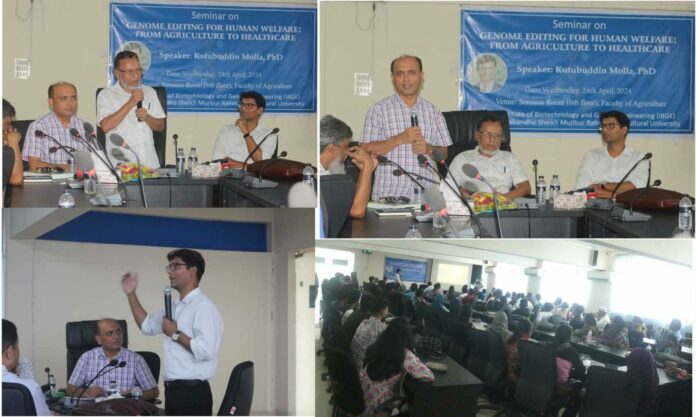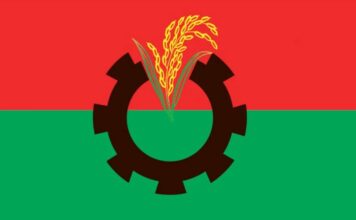Gazipur: Institute of Biotechnology and Genetic Engineering (IBGE) of Bangabandhu Sheikh Mujibur Rahman Agricultural University organized a one-day seminar titled “Genome Editing for Human Welfare: From Agriculture to Health Care”.
Dr. Fulbright scholar and scientist of Indian Institute of Agriculture Research and expert in genome editing attended the seminar as the main speaker. Qutbuddin Mollah. He is a world renowned young scientist in genome editing research. He is currently serving as an Assistant Features Editor for the journal Plant Cell. His lab at NRRI developed and continues to exploit novel genome editing tools.
He highlighted various aspects of the use and success of genome editing in agricultural production and healthcare. The agenda was 1) Crop Domestication 2) Genome Editing Tools 3) Agricultural Harvest in Field and 4) Healthcare Lab to Clinic. Provides latest updates on Natural Mutation, Artificial Selection, Genetic Variation, Crop Improvement, Mobile Crisper Cass Method, Prime Editing, Guide RNA, Chemical Breeding, etc. Until the last 20 centuries, selfless genetic modification was the only source from which humans could take advantage of new genetic diversity to select plants and animals suitable for domestication and breeding. Great advances in plant breeding were made when it was demonstrated that the genetic makeup of organisms could be altered by ionizing radiation. Dr. Mollah elaborated on the various methods of genome editing, weaknesses and modern and up-to-date more sophisticated methods for food security and safe healthcare in the future.
He said genome editing, also known as gene therapy or gene technology, is a powerful method of altering the DNA of living cells. This allows scientists to modify, delete, or add new genes to specific genes. Protecting crops from viruses, fungi, insects and other pests, increasing crop yields, reducing the use of pesticides, all these are done using genome editing (Crisper Cass).
A variety of genetic diseases including cystic fibrosis, Huntington's disease and thalassemia can be treated in India or Bangladesh using genome editing. Targeting cancer cells may lead to new therapies that may play a role in cancer eradication. Genome editing is a simple solution to infectious diseases such as HIV, malaria and tuberculosis. He explains the technological potential of genome editing and its implications with several examples and also emphasizes the differences, social acceptability, intellectual property and future research of genetically modified organisms (GMOs) and genome edited crops. An excellent interactive session with the enthralled participants at the end of the lecture was particularly helpful to delve deeper into the topic.
Prof. Dr. Tofazzal Islam, founder director of IBGE as the keynote speaker of the seminar said that genome editing has not only brought revolutionary changes in the field of agriculture but also opened up new areas of disease diagnosis and global research. He thinks that Bangladesh should also move forward in keeping with this modern research. At the same time, he invited the educated people of all levels to read his first book of Bangladesh "Genome Editing" written in Bengali. He believes that genome editing will be easily accessible and accepted by the people of Bangladesh after reading this book. Professor Tofazzal Islam Dr. Bhuyasi praised Qutb's essay and presentation style and thanked everyone present on behalf of IBGE. He pointed out the rationale of scientists from Bangladesh and India working together to develop climate smart crop varieties through the application of genome editing technology. Called Qutb to strengthen cooperation with his research team. Finally, he said. Qutb was gifted the book Genome Editing written by him in mother tongue Bengali.
He is Dr. He highlighted the achievements and future plans of the research collaboration with Qutb for the past 6 years. Mentions the financial support of the Bill & Melinda Gates Foundation for the application of their developed kit for rapid diagnosis of wheat blast disease through the use of genome editing in Africa, Asia and worldwide and thanked the donor organization.
Dean of the Faculty of Agriculture Professor Dr. Abdul Baset Miah attended the seminar as the chief guest; Director of IBGE Professor Dr. Mahbubur Rahman as guest of honor. Prof. Dr. AKM Aminul Islam (GPB) as special guest; Prof. Dr. Md. Ahsanul Haque Swapan (ENT); Prof. Dr. Fatema Khatun(ENT); Prof. Dr. Md. Morshedur Rahman (DPS); Prof. Dr. Mohiuddin (CBT); Prof. Dr. Shah Md. Naimul Islam (IBGE); Associate Professor and Head Haider Iqbal Khan (CBT); Associate Professor Deepali Rani Gupta (IBGE); Associate Professor and Head Dr Noore Alam Siddiqui (BMB); Associate Professor and Head Dr. Afsana Hossain (PLP) and Assistant Professor Dr. Afzal Sheikh (BMB) were present. Hundreds of teachers, researchers, Ph.D., Masters and Honors students from different faculties attended the seminar.
In the speech of the chief guest Professor Abdul Baset Mia. Bhuyasi praised Qutb's style of speech and depth of subject matter. He said it is the need of the hour to incorporate the breakthrough genome editing technology into the study and research of all departments of biology, such as computers and IT. He feels that it is important to include one more course at the undergraduate level on genome editing technology and advanced topics in biotechnology and he will take initiative in this regard in the Faculty of Agriculture as Dean. Thanking Prof. Tofazzal for organizing this seminar, Prof. Tofazzal has been contributing tremendously to the development and development of research culture in Bashemurkribi since joining. His research ideas are new and groundbreaking. Majority of Bashemurkribi's contribution to the research is from Professor Tofajjal's research team. His dream crop is IBGE. In his research, he not only inspired the teachers of Basheer Krabi, but also brought together the renowned scientists of the world to solve the urgent problems of his country. Dr. for young scientists. Tofajjal is a role model. He is a frontier researcher. I am always enriched by discussions with him.
At the end of the seminar, Dr. Mollah visited the labs and research activities of IBGE and praised the ongoing research and thanked the IBGE team. He commented that IBGE's state-of-the-art lab is world-class and one of the first in the world.










